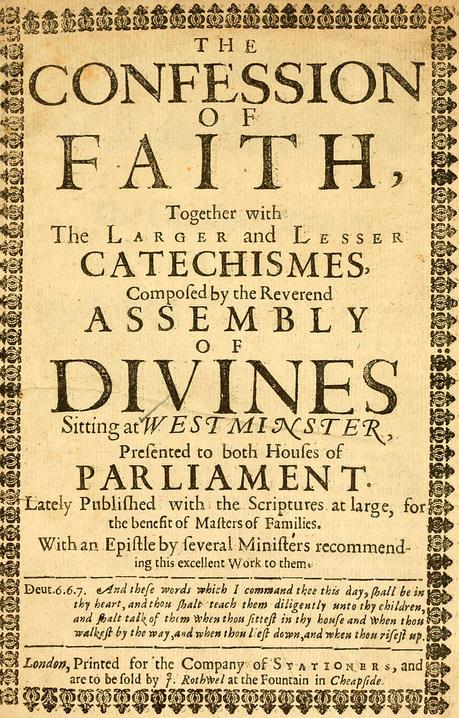Grace Thoughts
Why Learn a Christian Catechism? (Part Six)

We began writing a series about learning a Christian catechism a little more than a year ago. If you wonder why we decided to publish this series, we invite you to read the introduction here.
So far in our series, we’ve looked at catechisms of the Early Church, Luther’s Catechism, Calvin’s Catechism (also known as the Geneva Catechism), and the Heidelberg Catechism.
We turn next to the Westminster Catechisms.
Westminster History
You will notice in the image at the top of this article that the Westminster Catechisms (Shorter and Longer) were part of the Westminster Confession. A large group of pastors and theologians gathered at Westminster Abbey in London during the English Civil War (1642–1651). Religious freedom was one of the primary issues of the conflict, so the English Parliament called the theologians together in what became known as the Westminster Assembly. The theologians, from England and Scotland, met from 1643 to 1653. The result was the Westminster Confession and Catechisms.
The Westminster Confession of Faith has been used by many churches and denominations through the centuries. Some of the more recent confessions or catechisms have the Westminster Confession as its base.
The Westminster Shorter Catechism has 107 questions and answers. The Longer Catechism has 196 questions and answers. For the purpose of this series, we are sharing examples from the shorter catechisms for parents to consider teaching their children.
The Shorter Catechism is almost entirely a byproduct of the Larger but with a more personal focus, often considering the individual where the Larger Catechism considers the church. Christians using the Westminster Standards are best served when they use each of the documents as it was intended. The Westminster Confession serves as a quick-reference guide for careful statements of Christian doctrine. The Larger Catechism is intended as a teaching tool for churches and families, covering matters of faith and life. The Shorter Catechism is a tight summary of classic Christian doctrines, capable of being memorized even by a child.
The Shorter Catechism is well known for its crisp statements of key Christian doctrines. But its claim to fame is found in the questions and answers that bookend the whole and encapsulate a vision for the Christian life. First, “What is the chief end of man? Man’s chief end is to glorify God, and to enjoy him forever” (WSC 1). And, at the end, “What doth the conclusion of the Lord’s prayer teach us? The conclusion of the Lord’s Prayer, which is, For thine is the kingdom, and the power, and the glory, for ever. Amen, teacheth us to take our encouragement in prayer from God only, and in our prayers to praise him, ascribing kingdom, power, and glory to him; and, in testimony of our desire, and assurance to be heard, we say, Amen.” (WSC 107). Westminster 101
Westminster Shorter Catechism
- Questions 1-12 are about God as Creator
- Questions 13-20 are about original sin and humanity’s sinful nature
- Questions 21-38 are about Jesus Christ as Redeemer and the benefits of redemption
- Questions 39-84 are about the Ten Commandments
- Questions 85-97 are about the Sacraments
- Questions 98-107 are about the Lord’s Prayer
Q. 1. What is the chief end of man?
A. Man’s chief end is to glorify God, and to enjoy him for ever.
1 Cor. 10:31; Rom. 11:36; Ps. 73:25-28.
Q. 2. What rule hath God given to direct us how we may glorify and enjoy him?
A. The Word of God, which is contained in the Scriptures of the Old and New Testaments, is the only rule to direct us how we may glorify and enjoy him.
2 Tim. 3:16; Eph. 2:20; 1 John 1:3-4.
Q. 3. What do the Scriptures principally teach?
A. The Scriptures principally teach, what man is to believe concerning God, and what duty God requires of man.
2 Tim. 1:13; 2 Tim. 3:16.
Q. 4. What is God?
A. God is a Spirit, infinite, eternal, and unchangeable, in his being, wisdom, power, holiness, justice, goodness, and truth.
John 4:24; Job 11:7-9; Ps. 90:2; Jas. 1:17; Ex. 3:14; Ps. 147:5; Rev. 4:8; 15:4; Ex. 34:6-7.
Q. 5. Are there more Gods than one?
A. There is but one only, the living and true God.
Deut. 6:4; Jer. 10:10.
Q. 13. Did our first parents continue in the estate wherein they were created?
A. Our first parents, being left to the freedom of their own will, fell from the estate wherein they were created, by sinning against God.
Gen. 3:6-8, 13; Ecc. 7:29.
Q. 14. What is sin?
A. Sin is any want of conformity unto, or transgression of, the law of God.
1 John 3:4.
Q. 15. What was the sin whereby our first parents fell from the estate wherein they were created?
A. The sin whereby our first parents fell from the estate wherein they were created, was their eating the forbidden fruit.
Gen. 3:6, 12.
Q. 16. Did all mankind fall in Adam’s first transgression?
A. The covenant being made with Adam, not only for himself, but for his posterity; all mankind, descending from him by ordinary generation, sinned in him, and fell with him in his first transgression.
Gen. 2:16-17; Rom. 5:12; 1 Cor. 15:21-22.
Q. 17. Into what estate did the fall bring mankind?
A. The fall brought mankind into an estate of sin and misery.
Rom. 5:12.
Q. 21. Who is the Redeemer of God’s elect?
A. The only Redeemer of God’s elect is the Lord Jesus Christ, who, being the eternal Son of God, became man, and so was, and continueth to be, God and man in two distinct natures, and one person, for ever.
1 Tim. 2:5-6; John 1:14; Gal. 4:4; Rom. 9:5; Luke 1:35; Col. 2:9; Heb. 7:24-25.
Q. 22. How did Christ, being the Son of God, become man?
A. Christ, the Son of God, became man, by taking to himself a true body and a reasonable soul, being conceived by the power of the Holy Ghost, in the womb of the Virgin Mary, and born of her, yet without sin.
Heb. 2:14, 16; Heb. 10:5; Matt. 26:38; Luke 1:27, 31, 35, 42; Gal. 4:4; Heb. 4:15; Heb. 7:26.
Q. 23. What offices doth Christ execute as our Redeemer?
A. Christ, as our Redeemer, executeth the offices of a prophet, of a priest, and of a king, both in his estate of humiliation and exaltation.
Acts 3:21-22; Heb. 12:25 with 2 Cor. 13:3; Heb. 5:5-7; Heb. 7:25; Ps. 2:6; Isa. 9:6-7; Matt. 21:5; Ps. 2:8-11.
Q. 39. What is the duty which God requireth of man?
A. The duty which God requireth of man, is obedience to his revealed will.
Mic. 6:8; 1 Sam. 15:22.
Q. 40. What did God at first reveal to man for the rule of his obedience?
A. The rule which God at first revealed to man for his obedience, was the moral law.
Rom. 2:14-15; Rom. 10:5.
Q. 41. Where is the moral law summarily comprehended?
A. The moral law is summarily comprehended in the ten commandments.
Deut. 10:4; Matt. 19:17.
Q. 42. What is the sum of the ten commandments?
A. The sum of the ten commandments is, to love the Lord our God, with all our heart, with all our soul, with all our strength, and with all our mind; and our neighbor as ourselves.
Matt. 22:37-40.
Q. 85. What doth God require of us, that we may escape his wrath and curse, due to us for sin?
A. To escape the wrath and curse of God, due to us for sin, God requireth of us faith in Jesus Christ, repentance unto life, with the diligent use of all the outward means whereby Christ communicateth to us the benefits of redemption.
Acts 20:21; Prov. 2:1-5; Prov. 8:33-36; Isa. 55:3.
Q. 86. What is faith in Jesus Christ?
A. Faith in Jesus Christ is a saving grace, whereby we receive and rest upon him alone for salvation, as he is offered to us in the gospel.
Heb. 10:39; John 1:12; Isa. 26:3-4; Phil. 3:9; Gal. 2:16.
Q. 87. What is repentance unto life?
A. Repentance unto life is a saving grace, whereby a sinner, out of a true sense of his sin, and apprehension of the mercy of God in Christ, doth, with grief and hatred of his sin, turn from it unto God, with full purpose of, and endeavor after, new obedience.
Acts 11:18; Acts 2:37-38; Joel 2:12; Jer. 3:22; Jer. 31:18-19; Ezek. 36:31; 2 Cor. 7:11; Isa. 1:16-17.
Q. 88. What are the outward and ordinary means whereby Christ communicateth to us the benefits of redemption?
A. The outward and ordinary means whereby Christ communicateth to us the benefits of redemption are, his ordinances, especially the Word, Sacraments, and prayer; all which are made effectual to the elect for salvation.
Matt. 28:19-20; Acts 2:42, 46-47.
Q. 98. What is prayer?
A. Prayer is an offering up of our desires unto God, for things agreeable to his will, in the name of Christ, with confession of our sins, and thankful acknowledgment of his mercies.
Ps. 62:8; 1 John 5:14; John 16:23; Ps. 32:5-6; Dan. 9:4; Phil. 4:6.
Q. 99. What rule hath God given for our direction in prayer?
A. The whole Word of God is of use to direct us in prayer, but the special rule of direction is that form of prayer which Christ taught his disciples, commonly called, The Lord’s Prayer.
1 John 5:14; Matt. 6:9-13 with Luke 11:2-4.
Q. 100. What doth the preface of the Lord’s Prayer teach us?
A. The preface of the Lord’s Prayer, which is, Our Father which art in heaven,” teacheth us to draw near to God with all holy reverence and confidence, as children to a father, able and ready to help us; and that we should pray with and for others.
Matt. 6:9; Rom. 8:15; Luke 11:13; Acts 12:5; 1 Tim. 2:1-2.
Q. 107. What doth the conclusion of the Lord’s Prayer teach us?
A. The conclusion of the Lord’s Prayer, which is, For thine is the kingdom, and the power, and the glory, for ever. Amen,” teacheth us to take our encouragement in prayer from God only, and in our prayers to praise him, ascribing kingdom, power, and glory to him; and in testimony of our desire and assurance to be heard, we say, Amen.
Matt. 6:13; Dan. 9:4-9, 16-19; 1 Chr 29:10-13; 1 Cor. 14:16; Rev. 22:20-21.
You can read the entire Westminster Shorter Catechism here and here.
Next Time
We’ll look at Keach’s (Baptist) Catechism in the next part of our series.
Scripture taken from the New King James Version®. Copyright © 1982 by Thomas Nelson. Used by permission. All rights reserved.
GraceLife © 1990-2024
 Bible StudyCatechismChristianityJesus ChristWestminster Catechism
Bible StudyCatechismChristianityJesus ChristWestminster Catechism

Published by gracelifethoughts
Founder & Director of GraceLife Ministries View all posts by gracelifethoughts
